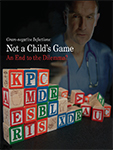
On Demand Replay
Gram-negative Infections: Not a Child’s Game
An end to the dilemma?
Thank you for your interest in this on demand activity. Please take a moment to review the program description, learning objectives, accreditation information, and faculty disclosures and biographies prior to viewing this activity. You will find the presentation at the bottom of this page.
*To claim credit for participation with this activity, please follow the link beneath the presentation window.
Program Description
According to the World Health Organization, between 3% and 12% of hospitalized patients in developed countries acquire a health care-associated infection (HAI). In the Extended Prevalence of Infection in Intensive Care (EPIC II) study, the ICU mortality rate of infected patients was more than twice that of non-infected patients (25% versus 11%; P < 0.001), as was the hospital mortality rate (33% versus 15%; P < 0.001).
Among all of the bacterial resistance problems, Gram-negative pathogens are particularly worrisome, because they are becoming resistant to nearly all drugs that would be considered for treatment. At times, the practitioner is forced to use a salvage therapy that is an older, less conventional and possibly more toxic with disconcerting mortality rates reported in the literature. Treating infections of either pan-resistant or nearly pan-resistant Gram-negative microorganisms is an increasingly common challenge in many hospitals and the probability of encountering such a pathogen is higher in the ICU than in other patient care areas.
With treatment options increasingly limited, it is more important than ever to understand the clinical implications of the epidemiology, complex resistance mechanisms, and pathogenesis of these changing organisms. A better understanding of the pathogens along with implementation of infection prevention and stewardship efforts will help practitioners use antibiotics more appropriately to optimize patient outcomes, reduce disease burden and preserve their life-saving potential.
Though issues associated with Gram-negative resistance, and the design of effective therapeutics are different and more complicated than those associated with the Gram-positives, several promising new agents are newly available or in late-stage clinical development.
Along with a review of the more concerning Gram-negative pathogens, this program will address the mechanisms of action, in vitro activity, pharmacokinetic/pharmacodynamics, clinical efficacy and toxicity issues for these novel as well as revived antimicrobial agents.
This program was originally presented on October 7, 2015 during IDWeek 2015.
Target Audience
This continuing medical education offering is intended to meet the needs of infectious disease specialists, critical care/pulmonologists, surgeons, pharmacists, and other members of the health care practitioner team including infection control and microbiologists who have an interest in the management of Gram-negative infections.
Learning Objectives
Upon completion of this knowledge activity, participants should be able to:
- Describe the scope, prevalence, and clinical implications of resistant gram-negative pathogen infections
- Outline how PK/PD parameters impact drug/dose optimization
- List currently available and pipeline treatment options for gram-negative infections and how these drugs may be useful for optimal antibiotic therapy in clinical practice
Accreditation Statement
Accreditation Statement
MedEDirect is accredited by the American Nurses Credentialing Center (ANCC), the Accreditation Council for Pharmacy Education (ACPE), and the Accreditation Council for Continuing Medical Education (ACCME), to provide continuing education for the healthcare team.

Credit Designation
MedEDirect designates this live educational activity for a maximum of 2.0 AMA PRA Category 1 Credits™ or 2.0 CPE credits (UAN # 0498-0000-15-010-H04-P).
Participants should claim credit commensurate with the extent of their participation in the activity. Participants must participate in the session and complete an activity evaluation before November 1, 2017. Pharmacists are required to pass the post-test with a minimum score of 70%.
Competencies
MedEDirect supports recommendations that will promote life long learning through continuing education. The following desirable physician attributes are addressed through this activity:
- Provide patient-centered care
- Work in interdisciplinary teams
- Employ evidence-based practice
- Apply quality improvement
Fee Information
There are no fees for participating in and receiving credit for this activity.
Computer Requirements:
Required Computer Hardware/Software:
Please ensure the computer you plan to use meets the following requirements:
- Peripherals: Computer speakers or headphones
- Monitor Screen Resolution: 320 x 480 or higher
Media Viewing Requirements: Adobe Reader, Microsoft PowerPoint, Flash Player & HTM
Obtaining Credit
ATTENDEE PROGRAM EVALUATION AND CME/CE FORM ONLINE INSTRUCTIONS
Activity Expires: 11/1/2017
To claim CME/CE credit, participants must complete the Program Evaluation and CME/CE Form in its entirety.*
1. Log in to your MedEDirect account or sign up for a free account by completing the registration form on the activity page (or use the log-in feature at the top of the page if already registered). Click “Continue”
2. Click on the Test and Evaluation, complete in its entirety and click “Next”
3. Physicians: Click “Download Certificate(s)”
Pharmacists: Credit statements are submitted directly to CPE Monitor.**
Please allow 5-7 business days for credits to post to your profile.
Faculty Bios
Andrew Shorr, MD, MPH
Associate Chief, Pulmonary and Critical Care
Washington Hospital Center
Associate Professor of Medicine
George Washington University
Washington, DC
 Andrew F. Shorr, MD, MPH, is Director (Interim) of Pulmonary and Critical Care at the Washington Hospital Center and Associate Professor of Medicine at Georgetown University. He received his undergraduate degree (public policy) from Princeton University, an MPH from Johns Hopkins University, and his medical degree from the University of Virginia. Dr Shorr’s research interests address healthcare outcomes, epidemiology in pulmonology/critical care, and infection in the hospitalized patient. He is an authority on healthcare outcomes research, a relatively new field requiring expertise in applying aspects of both traditional and social sciences. Health outcomes research can facilitate improvement in the practice and delivery of healthcare, thus limiting mortality and/or improving quality of health outcomes for patients.
Andrew F. Shorr, MD, MPH, is Director (Interim) of Pulmonary and Critical Care at the Washington Hospital Center and Associate Professor of Medicine at Georgetown University. He received his undergraduate degree (public policy) from Princeton University, an MPH from Johns Hopkins University, and his medical degree from the University of Virginia. Dr Shorr’s research interests address healthcare outcomes, epidemiology in pulmonology/critical care, and infection in the hospitalized patient. He is an authority on healthcare outcomes research, a relatively new field requiring expertise in applying aspects of both traditional and social sciences. Health outcomes research can facilitate improvement in the practice and delivery of healthcare, thus limiting mortality and/or improving quality of health outcomes for patients.
Dr Shorr is the author/co-author of nearly 300 peer-reviewed manuscripts and book chapters. He has served on the editorial board of Chest, currently serves on the editorial board of Critical Care Medicine, and is a reviewer on several medical and critical care journals. He also served as a Fullbright Specialist Scholar in 2010.
Thomas Lodise, PharmD, PhD
Associate Professor, Pharmacy Practice
Albany College of Pharmacy and Health Sciences
Albany, New York
 Thomas Lodise, Pharm.D., Ph.D., is Associate Professor at Albany College of Pharmacy and Health Sciences, Albany, New York. His current research explores the antibiotic exposure-response relationship in patients to develop antibiotic regimens and personalized patient care strategies that improve outcomes, reduce toxicity and minimize the emergence of antibiotic resistance. He is currently implementing epidemiological and outcomes research proposals at the Albany Medical Center and Stratton VA Medical Center, Albany, New York, where he also participates in the antibiotic stewardship program. He has published over 90 peer-reviewed articles and is an editorial board member for Antimicrobial Agents and Chemotherapy, Pharmacotherapy, and Diagnostic Microbiology and Infectious Diseases.
Thomas Lodise, Pharm.D., Ph.D., is Associate Professor at Albany College of Pharmacy and Health Sciences, Albany, New York. His current research explores the antibiotic exposure-response relationship in patients to develop antibiotic regimens and personalized patient care strategies that improve outcomes, reduce toxicity and minimize the emergence of antibiotic resistance. He is currently implementing epidemiological and outcomes research proposals at the Albany Medical Center and Stratton VA Medical Center, Albany, New York, where he also participates in the antibiotic stewardship program. He has published over 90 peer-reviewed articles and is an editorial board member for Antimicrobial Agents and Chemotherapy, Pharmacotherapy, and Diagnostic Microbiology and Infectious Diseases.
G. Ralph Corey, MD
Infectious Diseases
Professor of Medicine
Duke University Medical Center
Durham, NC
 G. Ralph Corey, MD is the Gary Hock Distinguished Professor of Global Health. He is also the Director of the Hubert/Yeargan Center for Global Health and Director of Infectious Disease Research at the Duke Clinical Research Institute. Dr Corey was the Program Director for the Internal Medicine Residency Training Program for 18 years. In 2003 he moved to the Duke Clinical Research Institute to become a Principal Investigator conducting international trials focused on blood stream infections, hospital-acquired pneumonia, wound infections, and complicated skin and soft tissue infections. In 2011 Dr Corey was appointed to Vice-Chair of Education and Global Health in the Department of Medicine as well as the Director of Global Health Clinical Activities for the Duke Global Health Institute.
G. Ralph Corey, MD is the Gary Hock Distinguished Professor of Global Health. He is also the Director of the Hubert/Yeargan Center for Global Health and Director of Infectious Disease Research at the Duke Clinical Research Institute. Dr Corey was the Program Director for the Internal Medicine Residency Training Program for 18 years. In 2003 he moved to the Duke Clinical Research Institute to become a Principal Investigator conducting international trials focused on blood stream infections, hospital-acquired pneumonia, wound infections, and complicated skin and soft tissue infections. In 2011 Dr Corey was appointed to Vice-Chair of Education and Global Health in the Department of Medicine as well as the Director of Global Health Clinical Activities for the Duke Global Health Institute.
Dr Corey’s areas of research interest include S. aureus and infective endocarditis, as well as tropical infections. He guided the initiation of the Staphylococcus aureus Bacteremia Group (SABG), which has prospectively identified, followed, and databased more than 2000 patients over 15 years. He also cofounded the International Collaboration on Endocarditis (ICE), which has prospectively identified, followed, and databased more than 5000 patients from 61 sites in 30 countries over the past 8 years. As a result of these efforts Dr Corey has published over 200 articles in peer-reviewed journals.
In 1985 Dr Corey began the Duke Global Health Program. The Hubert/Yeargan Center for Global Health was established in May 2005 as a result of Dr Corey’s commitment to global health issues and the generosity of the Hubert and Yeargan families. In 2006 he conceptualized and helped found a medical center-wide residency in Global Health. Dr Corey earned his undergraduate degree in physics from Duke University, his medical degree from Baylor College of Medicine and completed his internship, residency, chief residency and fellowship at Duke University Medical Center. He has been honored with numerous awards including the Golden Apple Award, the Eugene A. Stead Teaching Award, the Distinguished Faculty Award, and the Duke University Mentoring Award.
Scientific Integrity and Disclosure of Financial Interests
Support Statement
This activity is supported by an unrestricted educational grant from Tetraphase Pharmaceuticals.
Disclosures:
Faculty reported the following financial relationships. A copy of MedEDirect’s policy on resolving conflicts of interest can be found at www.mededirect.org/faculty.
Andrew F. Shorr, MD, MPH
Speaker for, consultant to, or received research support from: Actavis, Astellas, AZ, Bayer, Cubist, Pfizer, Roche, Theravance, Trius, Carefusion. Merck, Wockhardt
G. Ralph Corey, MD
Consultant/advisor to Achaogen, Cempra Pharmaceuticals, Cubist Pharmaceuticals, Forest/Cerexa, GlaxoSmithKline, The Medicines Company, Medtronic, Melinta, Merck, Motif, Nabriva, Rib-X Pharmaceuticals, Theravance Biopharma, and Trius Therapeutics. He has served as a primary investigator or otherwise participated in clinical trials for Dr. Reddy’s Laboratories, Forest/Cerexa, GlaxoSmithKline, The Medicines Company, Medtronic, Merck, Pfizer, and Theravance.
Thomas Lodise, PharmD, PhD
Speaker/consultant/contractor for Allergan, Merck, The Medicines Company; Speaker for Tetraphase Pharmaceuticals; Consultant for Achoagen, Parateck Pharmaceuticals
MedEDirect
Thomas Zimmerman, PhD (Reviewer, MedEDirect) has nothing to disclose.
Philip Scibilia, PhD (Reviewer, MedEDirect) has nothing to disclose
Danielle Amodio (Planner, MedEDirect) has nothing to disclose.
|
References and Resources
|
|


Not a member? Register here!